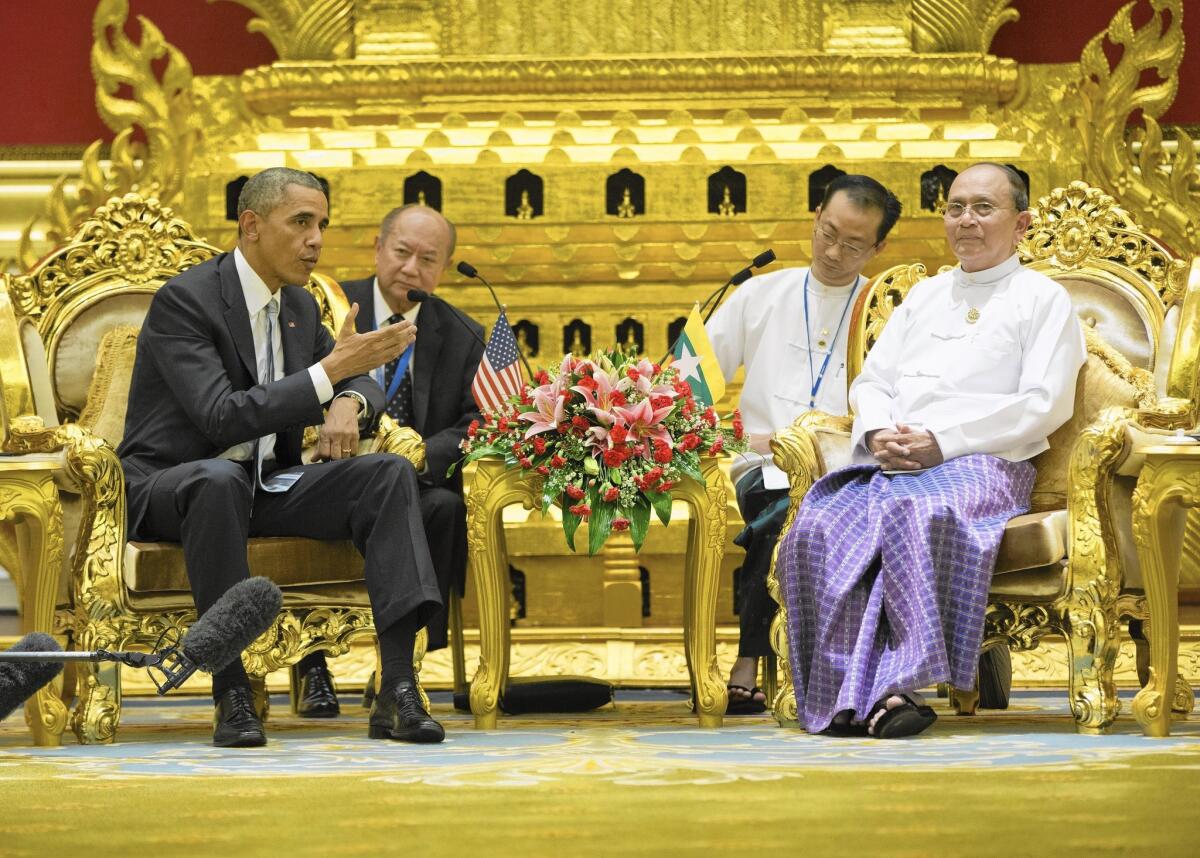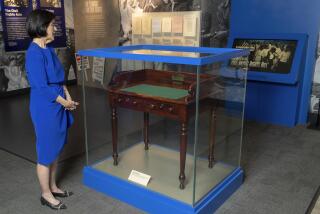Obama urges Myanmar to return to the path of democracy

Reporting from Naypyidaw, Myanmar — Invoking the United States’ own messy path to democracy, President Obama urged leaders here Thursday to right a young democracy veering off course and taking with it a once-touted U.S. foreign policy success in Asia.
Faltering government reforms and raging violence against ethnic minorities have led Obama and U.S. officials to downgrade their praise for Myanmar, which recently began to emerge from years of totalitarian rule and was quickly embraced by the Obama administration. In 2012, Obama became the first sitting U.S. president to visit here.
But on his second trip, pegged to a regional summit this week, he found himself in the awkward position of condemning human rights violations while cheering the quasi-military government’s improvements.
Obama said he spoke to parliamentary leaders about protecting minority rights and preventing the erosion of democracy.
“In the United States, we’ve had to wrestle with many of these questions as well, both in our founding and over the course of our democracy,” Obama said. “But the work is not yet done, and the goal of the United States here is to be a strong partner in the process. Like every good friend, we will praise what works. There will be times where we offer constructive criticism about a lack of progress in certain areas or where reform efforts have stalled.”
That prod-and-praise balancing act was echoed in Obama’s itinerary for this second of a three-leg trip that began in China and will end in Australia. After first attending a series of summit meetings in this gleaming capital city, built in just 10 years to house the new Myanmar government, the president traveled Thursday to a more storied city: Yangon, symbolic home of the opposition party, whose leaders are growing impatient with Obama’s embrace of the sitting government.
Among those who have urged Obama to take a harder line with the government of President Thein Sein is Aung San Suu Kyi, the Nobel laureate whose years of house arrest made her the international face of the independence movement. Obama met with Suu Kyi at length at her home in 2012, and in a speech to students placed himself on Myanmar’s road to democracy.
“When I took office as president, I sent a message to those governments who ruled by fear. I said, in my inauguration address, ‘We will extend a hand if you are willing to unclench your fist.’ And over the last year and a half, a dramatic transition has begun,” Obama told students then. “So today, I have come to keep my promise, and extend the hand of friendship.”
Two years later, the White House does not dispute that there is far less to celebrate. Myanmar’s government has continued to be swayed by military influence. And a conflict in Rakhine state between the Buddhist majority and a Muslim minority, known as the Rohingya, has resulted in thousands of Muslims being killed or sent to detainment camps, under the eye of a government rife with prejudice.
Some 140,000 people, mostly Rohingya, are displaced and living in camps, dependent on international aid, according to Human Rights Watch estimates. The group accuses the government of not prosecuting those responsible for what it calls a rash of “ethnic cleansing” in Rohingya communities two years ago.
Meanwhile, the holder of the American hopes, Suu Kyi, has remained silent on the issue, much to the frustration of rights groups.
Obama met separately with Thein Sein and Suu Kyi on Thursday. He was to visit Suu Kyi’s home again Friday.
The president’s advisors say he has too much invested to walk away from Myanmar, and he doesn’t see the current troubles as a death knell for the democracy movement.
“Nobody’s locking in opinions on Burma,” said Ben Rhodes, deputy national security advisor to Obama, using the opposition movement’s preferred name for the country. “There’s a lot that needs to be done. They have a long way to go. Because we lift it up for attention, people sometimes think it’s a done story. But it’s really just the middle.”
The White House has said it’s committed to continued diplomacy, engagement and economic development in Myanmar. On Thursday, the administration announced it was sending the Peace Corps there for the first time.
Officials said Obama planned to use the meeting with government leaders to urge them to ensure that elections next year are “credible” and fair, and for pushing for constitutional reforms. Of particular concern to Suu Kyi and her opposition party is the government’s refusal to change a provision of the constitution that requires that a quarter of the seats in the parliament be reserved for members of the military.
One bit of leverage the U.S. holds is its considerable aid package. Since 2012, the U.S. has sent more than $225 million to Myanmar. This year the package will amount to more than $150 million.
In Yangon, some are prepared for the slow pace of change.
“We hope that Mr. Barack Obama coming here will make better conditions for us,” said Zay Myo Aung, 35, an electrical engineer. “I think things will change later, now only a little. The military still want to hold power.”
Parsons reported from Naypyidaw and Hennessey from Washington. Special correspondent Simon Roughneen in Yangon contributed to this report.
More to Read
Sign up for Essential California
The most important California stories and recommendations in your inbox every morning.
You may occasionally receive promotional content from the Los Angeles Times.












